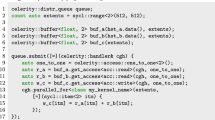Abstract
OpenMP includes in its latest 4.0 specification the accelerator model. In this paper we present a partial implementation of this specification in the OmpSs programming model developed at the Barcelona Supercomputing Center with the aim of identifying which should be the roles of the programmer, the compiler and the runtime system in order to facilitate the asynchronous execution of tasks in architectures with multiple accelerator devices and processors. The design of OmpSs is highly biassed to delegate most of the decisions to the runtime system, which based on the task graph built at runtime (depend clauses) is able to schedule tasks in a data flow way to the available processors and accelerator devices and orchestrate data transfers and reuse among multiple address spaces. For this reason our implementation is partial, just considering from 4.0 those directives that enable the compiler the generation of the so called “kernels” to be executed on the target device. Several extensions to the current specification are also presented, such as the specification of tasks in “native” CUDA and OpenCL or how to specify the device and data privatization in the target construct. Finally, the paper also discusses some challenges found in code generation and a preliminary performance evaluation with some kernel applications.
Access this chapter
Tax calculation will be finalised at checkout
Purchases are for personal use only
Preview
Unable to display preview. Download preview PDF.
Similar content being viewed by others
References
Nvidia CUDA parallel computing and programming, http://www.nvidia.com/cuda
OpenCL Open Computing Language, http://www.khronos.org/opencl/
OpenACC: Directives for Accelerators, http://www.openacc-standard.org
The OpenMP API Specification for Parallel programming, http://www.openmp.org
Barcelona Supercomputing Center. The OmpSs programming model, http://pm.bsc.es/ompss
Bellens, P., Perez, J.M., Badia, R.M., Labarta, J.: CellSs: A programming model for the Cell/B.E. architecture. In: ACM/IEEE Supercomputing (November 2006)
Bueno, J., Planas, J., Duran, A., Badia, R.M., Martorell, X., Ayguade, E., Labarta, J.: Productive programming of GPU clusters with OmpSs. In: IEEE 26th International on Parallel Distributed Processing Symposium (IPDPS) (May 2012)
Perez, J.M., Badia, R.M., Labarta, J.: A dependency-aware task-based programming environment for multi-core architectures. In: IEEE International Conference on Cluster Computing (September 2008)
Barcelona Supercomputing Center. Mercurium source-to-source compiler, http://pm.bsc.es/mcxx
Barcelona Supercomputing Center. Nanos++ runtime library, http://pm.bsc.es/nanos
Vadlamani, S., Kim, Y., Dennis, J.: DG-kernel: A climate benchmark on accelerated and conventional architectures. In: Extreme Scaling Workshop (XSW) (August 2013)
NAS Division. NAS parallel benchmarks, http://www.nas.nasa.gov/resources/software/npb.html
CAPS Entreprise, CAPS Compiler, http://www.caps-entreprise.com
PGI Accelerator Compilers, http://www.pgroup.com/resources/accel.htm
Han, T.D., Abdelrahman, T.S.: Hicuda: A high-level directive-based language for gpu programming. In: 2nd Workshop on General Purpose Processing on Graphics Processing Units (GPGPU) (March 2009)
Lee, S., Min, S.-J., Eigenmann, R.: OpenMp to GPGPU: A compiler framework for automatic translation and optimization. In: 14th ACM SIGPLAN Symposium on Principles and Practice of Parallel Programming (PPoPP) (February 2009)
Liao, C., Yan, Y., de Supinski, B.R., Quinlan, D.J., Chapman, B.: Early experiences with the openMP accelerator model. In: Rendell, A.P., Chapman, B.M., Müller, M.S. (eds.) IWOMP 2013. LNCS, vol. 8122, pp. 84–98. Springer, Heidelberg (2013)
Author information
Authors and Affiliations
Editor information
Editors and Affiliations
Rights and permissions
Copyright information
© 2014 Springer International Publishing Switzerland
About this paper
Cite this paper
Ozen, G., Ayguadé, E., Labarta, J. (2014). On the Roles of the Programmer, the Compiler and the Runtime System When Programming Accelerators in OpenMP. In: DeRose, L., de Supinski, B.R., Olivier, S.L., Chapman, B.M., Müller, M.S. (eds) Using and Improving OpenMP for Devices, Tasks, and More. IWOMP 2014. Lecture Notes in Computer Science, vol 8766. Springer, Cham. https://doi.org/10.1007/978-3-319-11454-5_16
Download citation
DOI: https://doi.org/10.1007/978-3-319-11454-5_16
Publisher Name: Springer, Cham
Print ISBN: 978-3-319-11453-8
Online ISBN: 978-3-319-11454-5
eBook Packages: Computer ScienceComputer Science (R0)



